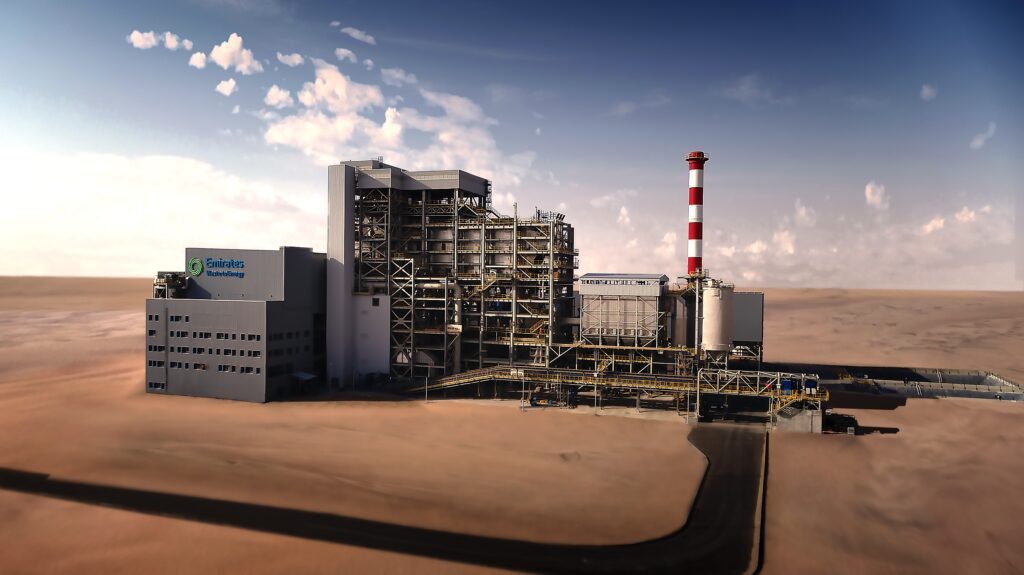The Sharjah Waste to Energy facility, which is a unique project in the Middle East, has reached several significant milestones since it was launched one year ago. The plant is connected to the Sharjah power grid, and it has produced enough energy to supply electricity to more than 2,000 homes annually while preventing the release of 150,000 tonnes of CO2 emissions.
In the UAE, around 60% of greenhouse gas emissions result from household and industrial waste decomposing in landfills. Since its establishment, the facility has handled more than 100,000 tonnes of waste, which is equivalent to the amount generated by 180,000 individuals in a year. Moreover, it has recovered over 250 tonnes of metal during its operations, and Sharjah has now set a new zero-waste to-landfill benchmark by achieving a 90% waste diversion rate.
The Sharjah Waste to Energy plant was launched in May 2022 as a joint venture between BEEAH Group, a sustainability trailblazer in the Middle East, and Masdar, a leading clean energy firm. Khaled Al Huraimel, CEO of BEEAH Group, stated that the Sharjah Waste to Energy plant exemplifies successful cooperation in promoting the UAE’s sustainability agenda, according to WAM.
“In partnership with Masdar, we have pioneered a waste-to-energy innovation that adds to the national clean energy mix, while also accelerating toward our zero-waste-to-landfill targets in Sharjah.
We have also achieved 90 percent landfill waste diversion, a new record for the Middle East, which highlights the positive impact energy innovations can have on sustainable waste management. The Sharjah Waste to Energy plant demonstrates how clean energy can not only help meet energy demand but also recover valuable material and tackle the mounting challenge of waste in growing cities across the Middle East.”
The facility is gradually increasing its operations to generate 30 MW of power per year while processing 300,000 tonnes of waste that would otherwise end up in landfills. Within one year, the plant can offset 450,000 tonnes of CO2 emissions.
Mohamed Jameel Al Ramahi, CEO of Masdar, said, “Achieving the landmark of 100,000 tonnes of waste processed within the first year of operation is a fantastic milestone on our journey towards pioneering worldwide efforts towards decarbonisation. Utilising the latest innovative technologies, the plant has played a leading role in Sharjah’s 90 percent landfill waste diversion success and in supporting the UAE’s goal of diverting 75 percent of solid waste from landfills. We look forward to boosting R&D investment in waste-to-energy projects and working with BEEAH to further accelerate the reduction of global carbon emissions and divert waste from landfills.”
The Sharjah Waste to Energy plant is situated in the Al Sajaa district of Sharjah, adjacent to BEEAH’s integrated waste management complex, where recycling facilities are also being used to achieve higher rates of landfill waste diversion.
The Sharjah Waste to Energy plant uses incineration to process waste and produce a flue gas that conforms to the environmental standards of the European Union. The heat created during this process is retrieved and utilized in a steam boiler that, in turn, drives an electric turbine to generate electricity. The plant has one of the highest boiler and thermal efficiency rates in the industry.
In December of last year, BEEAH and Masdar collaborated with Veolia Near & Middle East to manage and maintain the waste-to-energy plant according to international best practices for a 25-year term. Thus far, the plant has purified 463 million m3 of air, which is equivalent to filling the Burj Khalifa 255 times.
The Sharjah Waste to Energy facility is the inaugural project of the Emirates Waste to Energy joint venture between BEEAH and Masdar. The joint venture is working to launch more waste-to-energy plants across the UAE and the broader region to develop integrated solutions for achieving zero-waste to landfill and net-zero emissions.


